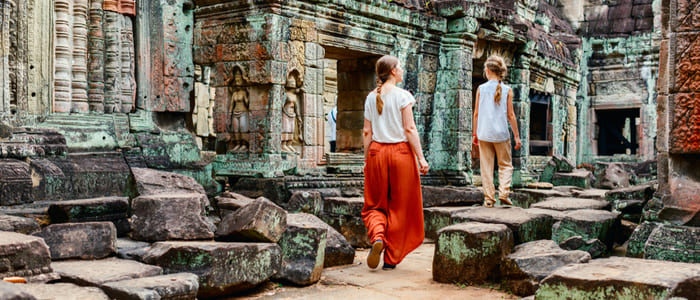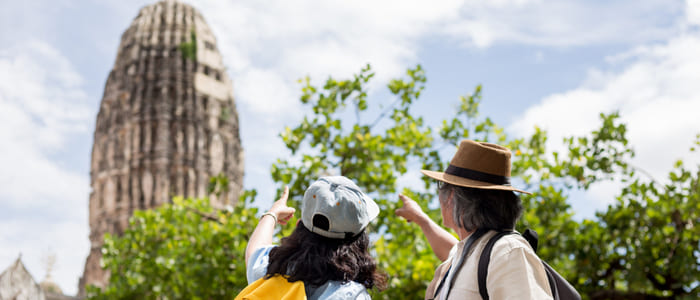
Understanding a country's culture is crucial for any traveler, especially when visiting Southeast Asia. Western tourists may find many Asian customs unfamiliar, but by respecting Cambodian traditions and following basic etiquette, they can expect a warm welcome.
Cambodians are known for their friendliness, remarkable optimism, and hospitality. With a recently introduced Cambodian eVisa, discovering this fascinating culture is just a few clicks away!
Apply for your eVisa today and start your cultural journey in Cambodia
Explore Cambodia's Culture with Your eVisa
Cambodian eVisa offers convenience and flexibility. With the online application process, you can skip long visa queues and start your cultural journey faster. The main benefits include:
- Convenience: Applying online makes the process quick and straightforward.
- Accessibility: The eVisa provides access to cultural landmarks, such as Angkor Wat Complex or the floating village on Tonle Sap Lake, without the stress of visa-on-arrival lines.
- Flexibility: The eVisa allows you to stay for up to 30 days, giving you plenty of time to explore Cambodia at your own pace. It is
- Long Validity Period: The eVisa is valid for 3 months from the date of issue.
- Short processing time: Receive your eVisa in just 3 days.
Practical Advice for eVisa Travelers
Here are a few tips to help make your Cambodian adventure more enjoyable:
- Passport: Ensure it’s valid for at least six months beyond your departure date.
- Visa: Apply for your Cambodian visa online in advance.
- Printed Copies: Keep your passport and a printed copy of your eVisa for checkpoints or accommodations.
- Health Precautions: Update basic vaccinations (DTP, Hepatitis A & B). Depending on travel regions, consider malaria prevention.
- Currency: The Riel (KHR) is the official currency; US dollars are widely accepted. Carry both for convenience.
- Tipping: Not mandatory but appreciated (5-10% in restaurants, and for service providers).
- Travel with Modest Clothing: Important for temple visits and local respect.
- Engage Locals with Politeness: Use simple Khmer phrases like “Hello” (Sour Sdei) or “Thank you” (Orkun).
Key Cambodian Customs and Traditions
To help you navigate your cultural experience, here’s an overview of the key Cambodian customs and practices to observe during your visit.
Respect for religion
In Cambodia, 95% of the population follows Theravada Buddhism, which values karma and collectivism.
Public criticism and raising one's voice are seen as disrespectful. It's important to allow others to "save face" in conversations. When offered a gift, it should be accepted with both hands after an initial polite refusal.
Greeting etiquette
Forget the usual handshake greeting. The traditional Cambodian greeting, the Sampeah, involves placing your palms together in a prayer-like position and bowing your head slightly.
The higher the palms are placed, the more respectful the greeting. For example, when greeting or bidding farewell to a monk, the palms will be placed near the tip of the nose.
Table manners
In Cambodia, chopsticks are commonly used. It's considered bad luck to leave chopsticks standing upright in food, as it resembles incense burned for the deceased.
Instead, they should be placed horizontally on the plate. Always use your right hand for eating and avoid using the left hand for anything, as it's considered impolite.
Always remove your shoes
It’s customary to remove your shoes before entering any home or religious building. You’ll often see shoes neatly arranged or scattered at the entrance, as they are not allowed inside. This is a key aspect of Khmer etiquette.
Cultural Dos and Don’ts for Travelers in Cambodia
Understanding and respecting local customs is essential for a positive experience during your trip. Here are some key cultural practices to keep in mind:
Cultural Dos:
- Dress modestly, especially at temples—cover your shoulders and avoid wearing short skirts.
- Show respect to elders and monks at all times.
- Bring a small gift, such as fruit or flowers, when visiting someone’s home.
- Offer a small donation as a gesture of respect when visiting temples.
Cultural Don’ts:
- Avoid touching someone’s head; it is considered sacred.
- Never point your feet at people or religious symbols, as it is seen as disrespectful.
- Refrain from public displays of affection.
- Do not touch or hand anything directly to a monk; women, in particular, should avoid direct interaction.
- Always ask for permission before taking photos in temples or of monks.
- Steer clear of discussing sensitive topics like politics or war.
Cambodian Festivals and Cultural Events
Throughout the year, Cambodia celebrates its culture with colorful festivals. Here are a few key celebrations you could participate in:
Khmer New Year (April)
The Khmer New Year marks the end of the harvest season, allowing farmers to enjoy the fruits of their labor before the rainy season begins. Over three days, people honor Buddha, practice charity, and wash statues and elders with fragrant water for blessings.
Pchum Ben (September/October)
Pchum Ben is a Cambodian festival rooted in Buddhism, reflecting beliefs in karma, reincarnation, and ancestral care. It’s believed the gates of hell open during this time, and Yama, the god of death, releases spirits.
Descendants offer food and perform deeds to ease their ancestors’ suffering, as spirits can only consume offerings from their own family.
Bon Om Touk (November)
Known as the Water Festival, Bon Om Touk celebrates the change of the Tonle Sap River's flow. It marks the end of the rainy season and the return of water to the sea.
Visitors can see the exciting boat races, a tradition dating back to the 12th century. The event is held during the full moon, highlighting Cambodia’s cultural heritage and deep connection to nature.
eVisa Tip: Plan ahead and apply for your Cambodia eVisa well in advance if you wish to experience these bright festivals, as they often coincide with peak travel seasons.
Traveling to Cambodia with an eVisa Is Simpler Than Ever!
Exploring Cambodia’s culture is a rewarding journey.
To fully appreciate the country, understanding Cambodia’s culture is key. It allows you to connect with the values that shape the heart of Cambodian society, offering a more meaningful travel experience.
The Cambodian eVisa simplifies your cultural journey, allowing you to fully immerse yourself in the beauty and depth of Khmer traditions without the hassle of paperwork.
Apply for your eVisa today and experience Cambodia beyond the surface!


